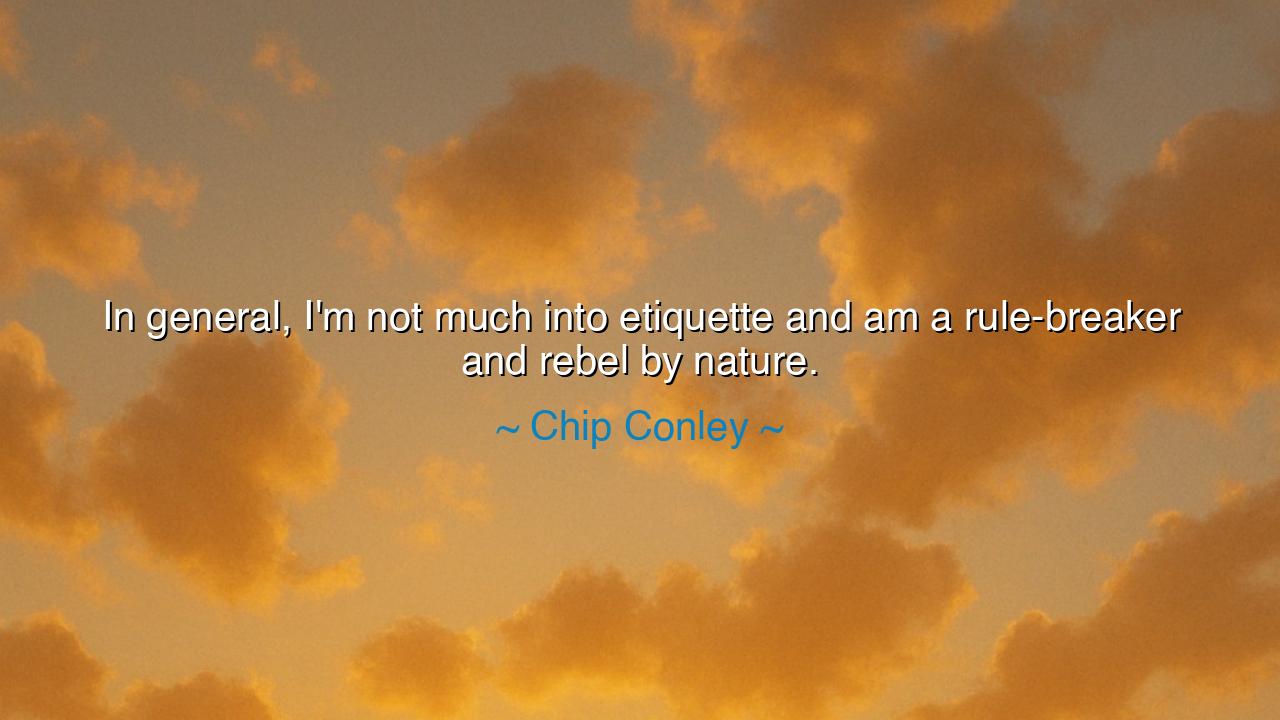
In general, I'm not much into etiquette and am a rule-breaker






Hear the fiery words of Chip Conley, spoken with the spirit of one unafraid to walk against the grain: “In general, I’m not much into etiquette and am a rule-breaker and rebel by nature.” In these words resounds the eternal cry of those who refuse to be bound by conventions, who look upon the lines drawn by society and dare to step beyond them. It is not contempt for all order, but the recognition that many rules are cages, built not to protect truth, but to preserve comfort and control. The rebel does not live to destroy, but to discover—to seek a greater freedom that lies hidden beyond the walls of custom.
Etiquette, as Conley names it, is the artifice of form, the mask of society. It teaches men when to bow, how to speak, where to sit. It has its place, for without some manners, there would be chaos. Yet when etiquette becomes an idol, it enslaves the soul, forcing men to obey appearances while neglecting substance. The rule-breaker, by his nature, refuses such hollow worship. He asks, “Why must this be done so?” And when no answer of truth is given, he casts aside the empty ritual and seeks the heart of the matter.
History gives us many such spirits. Consider Galileo Galilei, who dared to look through his telescope and proclaim that the earth was not the center of the universe. Against the strict etiquette of the Church, against the laws of silence imposed by fearful authorities, he stood as a rebel. For this he was condemned, but his courage shattered the prison of ignorance and opened the heavens to mankind. In him we see the rule-breaker’s gift: to endure persecution so that truth may one day prevail.
The rebel by nature is not a destroyer of order, but a builder of new possibilities. Where others bow to tradition, he questions. Where others cling to the safety of the known, he ventures into the wilderness of the unknown. Without such men and women, humanity would stagnate, bound forever to the customs of yesterday. Every great change—every revolution in science, art, and spirit—has been born from those who dared to say, “This rule does not serve truth; let us find a better way.”
Yet there is danger also in rebellion. To break rules merely for vanity or chaos is to exchange one prison for another. The rule-breaker must be guided by wisdom, not by pride. True rebellion is not against order itself, but against falsehood disguised as order. The wise rebel knows which chains are unjust and must be broken, and which bonds are sacred and must be honored. Thus, the path of the rebel is not the path of destruction, but the path of discernment.
The lesson, then, is this: question the rules that bind you. Do not accept etiquette merely because it is old, nor obey laws merely because they are written. Ask yourself: does this serve truth, justice, and the flourishing of life? If it does, respect it; if it does not, have the courage to resist. For it is the mark of the strong to live not by blind obedience, but by conscious choice.
Practical steps may guide you: cultivate the courage to speak when silence is demanded, to act when fear urges you to wait, to think when others tell you not to question. But also cultivate humility, so that your rebellion is not pride but service to a higher good. Surround yourself with those who also seek truth, for a lone rebel may falter, but together rebels become a movement that changes the course of history.
Remember always: the world is moved forward by the rebels by nature, those who refuse to bow before false gods of custom and who live not for appearances but for truth. To break a rule for the sake of justice is not disobedience—it is devotion to a higher law. Let your rebellion, then, be not reckless, but righteous. And in this way, like Galileo, like every visionary before him, you too may leave behind not a record of obedience, but a legacy of transformation.






AAdministratorAdministrator
Welcome, honored guests. Please leave a comment, we will respond soon